


The authors of this book believe,--
1st.--That the Word Method is the most natural and practicable, because words are representatives of objects, actions, etc., while letters, or sounds, in the abstract, convey no meaning to the pupil, and are devoid of interest.
2d.--That words of ordinary length are as easily learned as short ones, provided they are familiar to the pupil. No teacher will doubt the statement that a pupil will learn the word "mamma'" as easily as "says" or "eyes."
3d.--That frequent "Reviews" are essential to the rapid and thorough advancement of pupils. By this means the words imperfectly learned are again brought to their attention and thoroughly memorized. That these "Reviews" ought to take up the new words in a different order and arrangement, in order to test the ability of the pupil to recognize them in any situation. That as soon as the vocabulary is large enough they should be written in the form of a new exercise, as on pp. 36, 44, 52, 60, and 68 of this book.
4th.--That thorough and systematic drill in Spelling is absolutely necessary. That the "Reading Reviews" should be so constructed as to contain all the new words used in the lessons they were intended to review, and no others, so that they can be used for "Written or Dictation Spelling." That the pronunciation of the words in the "Spelling Reviews" should be indicated by the diacritical marks of Webster, so that they can be used for either "Oral Spelling" or "Phonic Drill."
5th.--That the "Script" from which the pupil gets his first and most lasting impressions should be of large size and accurate form, and not of the nondescript character usually found in books of this class. That it should be free from superfluous line and flourish, and yet have grace and beauty. That it should be adapted for both copying and reading.
6th.--That the lessons should be largely "conversational in style," to cultivate flexibility of voice and to break up the dreary monotone so frequently heard among children.
7th.--That the lessons of a book of this grade should not average more than seven "new words." That all such words should appear at the commencement of lessons, and be familiar to the pupil. That this method secures careful gradation, and is in marked contrast with the old custom of having from fifteen to twenty-five.
8th.--That "Outline Drawings" of the objects first presented to pupils should be made in the presence of the class, as it stimulates them to draw, and thus makes easy and profitable the copying of the "Script Exercises."
9th.--That the schoolbook of to-day must be beautifully and copiously illustrated. That there must be variety as well as excellence, both in drawing and engraving. That well-known and famous artists must be secured, such as Harper, Fredericks, Church, Lippincott, Eytinge, White, Beard, Weldon, Thulstrup, Cary, Moser, Weaver, and Share; and such engravers as Karst, Wigand, French, Held, Davis, Hellawell, etc.
10th.--That the exercises must be instructive as well as interesting, and that no artificial system of vowel classification ought to interfere with the free and natural use of words.
11th.--That a book of this kind should be suited to the wants of graded and ungraded schools, there evidently being nothing in the one not readily adaptable to the other.
12th.--That every book of this class should contain a collection of brief extracts from standard literature to be committed to memory.
13th.--That this book is constructed on the above principles.



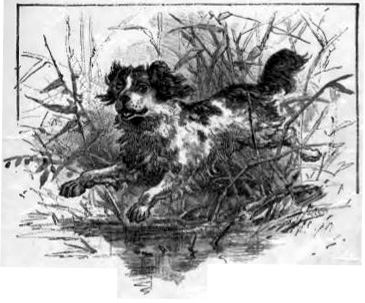
| dog it is a dog |
It is a dog.
 | 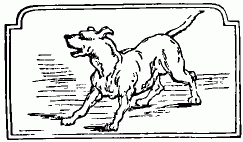 |  |
| boy | the | and | run | see |
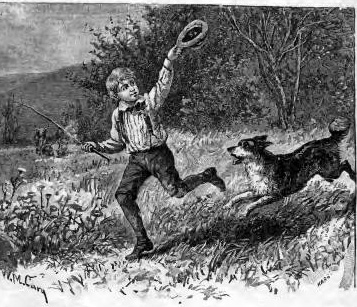
See the boy and the dog.
The boy and the dog run.
 |
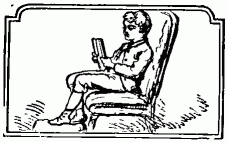 |
 |
| rat | big | can | get | this |
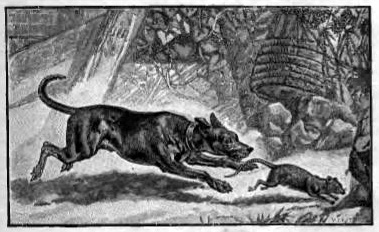
This is a big rat.
Can the dog get the rat?
The dog can get the rat.
 | 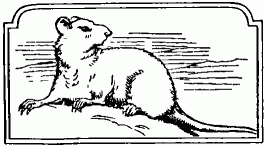 |  |
| hen | nest | box | on | in |
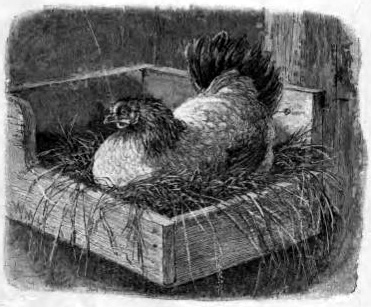
See the hen and the nest.
The hen is on the nest.
The nest is in a box.
 | 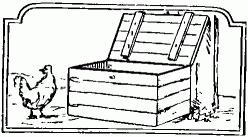 |  |
| cat | egg | will | an | at |
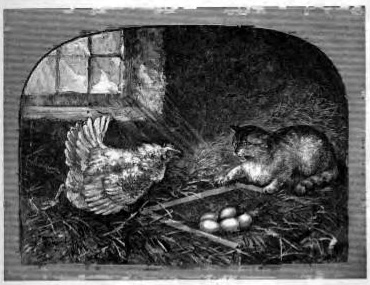
The big cat is at the nest.
Will the cat get an egg?
See the hen run at the cat!
Run, hen, run!
 | 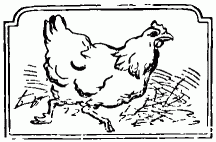 |  |
See the boy and the dog.
Is it a big dog?
The dog can get the big rat.
Is this hen on the nest?
Is the nest in a box?
The big cat is at the nest.
Will the cat get an egg?
The hen will run at the cat.
| ĭt | ăt | bĭḡ | ŧhē | sēe⃥ | răt |
| ĭs̝ | ăn | dŏḡ | ănd | c̵ăn | hĕn |
| ĭn | ŏn | boy | rŭn | ḡĕt | bŏx |
| c̵ăt | ĕḡg⃥ | wĭll⃥ | ŧhĭs | nĕst |
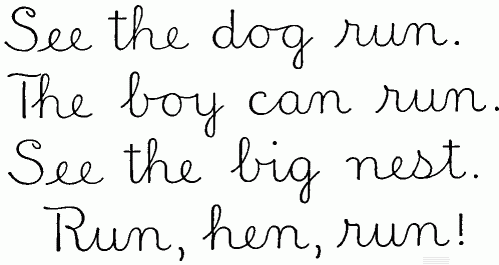
| See the |  | and the |  |
| The |  | ran at the |  |
| The |  | ran at the |  |
| Can the |  | get the |  |
| The |  | is in the |  |
| The |  | is in the |  |
| his | fast | yes | not | as | them |
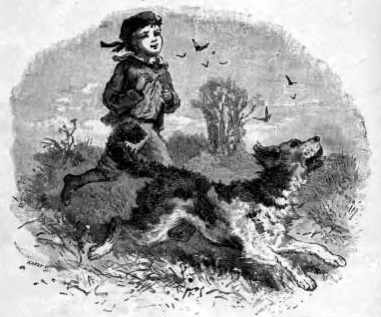
This is a boy and his dog.
Can the boy and his dog run fast?
Yes. See them run.
The boy can not run as fast as the dog. Run, boy, run!

| white | little | bird | eggs | you | are | do | I |
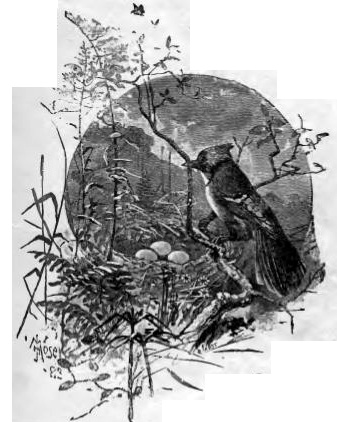
Do you see this little bird?
Yes, I see the little bird.
Do you see this little nest?
Yes, and I see the eggs in it.
The eggs in the nest are white.

| Ann | play | her | ran | girl | was | likes |
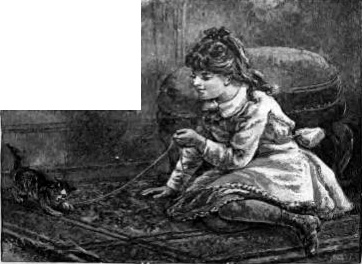
Do you see the little girl and her cat? See them play.
This little girl is Ann.
Ann likes her cat.
This cat was in a nest.
A hen ran at her.

| top | has | spin | how | he | makes |
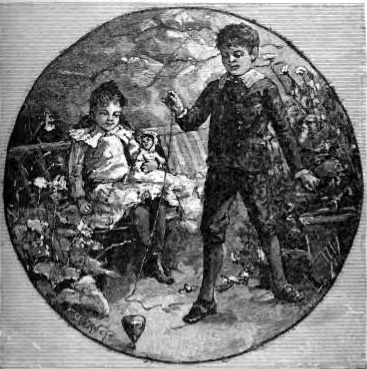
The boy has a big top.
Spin! Spin! Spin!
See how he makes it spin!
Can you spin a top?
Yes, I can spin a top.
A boy likes a big top.
The boy and his dog can run fast. Do you see them run? Can the dog run as fast as the boy? Yes, he can.
I do not see the little bird. I see the eggs in the nest. Are the eggs white? Yes, the eggs are white.
Was the girl Ann? Yes. Her cat likes play. Was the cat at the nest? Yes, and the hen ran at her.
The boy has a top. See how fast he makes it spin! Can you spin a top? Yes, I can spin a top.
 | 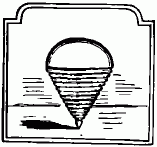 |  |
| Ī | hăs̝ | răn | ŧhĕm |
| ăs̝ | hĭs̝ | ĕḡg⃥s̝ | fȧst |
| do̤ | yĕs | bĩrd | whīte⃥ |
| hē | nŏt | ḡĩrl | plāy⃥ |
| y⃥o⃥ū | äre⃥ | spĭn | līke⃥s |
| wạs̝ | Ănn⃥ | how | māke⃥s |
| (wŏz) | hẽr | tŏp | lĭt'tle⃥ |
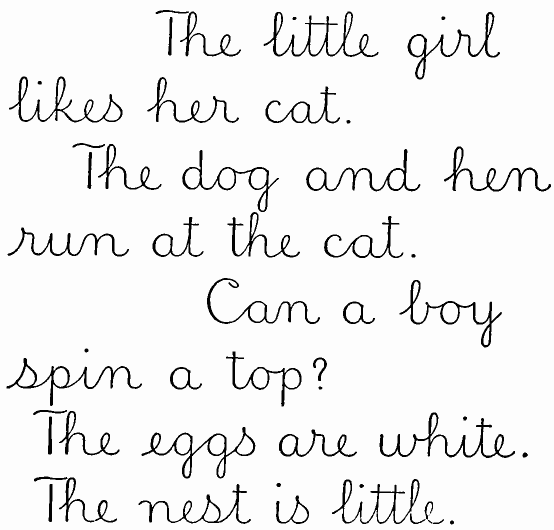
| tree | birds | floor | cats | rats |
| one | two | three | four |

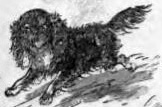 |
One, one, one, Little dog, run. |
| Two, two, two, Cats see you. |
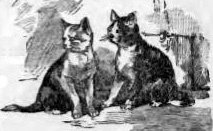 |
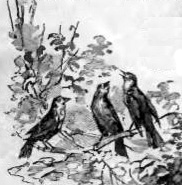 |
Three, three, three, Birds in a tree. |
| Four, four, four, Rats on the floor. |
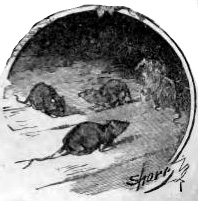 |
| good | to | hat | like |
| gave | doll | new | mam ma' |
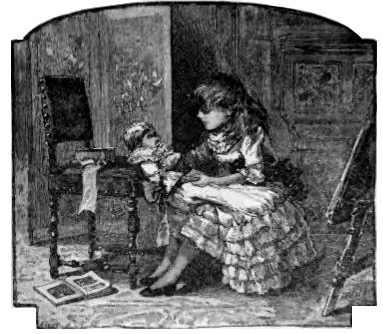
Ann has a new doll.
Her mamma' gave it to her.
Ann likes the doll, and will get it a new hat.
Are you a good girl?
Do you like a doll?
| O | may | ride | too | my |
| me | put | take | with |
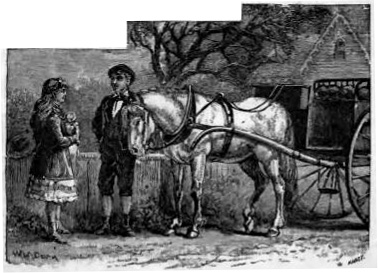
Ann, will you take a ride with me?
O yes! I will. May I take my doll too?
Yes, you may take the doll.
Ann will put on her hat, and take her doll to ride.

| we | five | ver'y | snow |
| that | they | those | pret'ty |
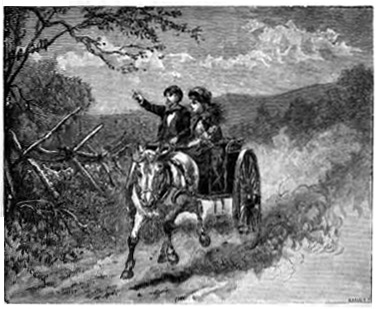
How fast we ride! I like to ride, and my doll likes it too.
Ann, do you see those five little birds on that tree?
O yes! I see them. Are they not very pretty birds?
Yes. They are snowbirds.
I see one dog and two cats. Do you see the three birds in the tree, and the four rats on the floor?
Yes, and I see the new doll my good mamma' gave to Ann. I like the doll. It is a very pretty one. May I take it to ride?
O yes! and I will put on my hat and take a ride too. Do you see me with my doll?
Do we not ride fast? See those five snowbirds in that tree. Are they not pretty birds?

| Ō | one | fōu⃥r | ḡāve⃥ |
| to̤ | (wŭn) | snōw⃥ | fīve⃥ |
| mē | tw⃥o̤ | dŏll⃥ | ŧhōs̝e⃥ |
| mȳ | (to͞o) | līke⃥ | ŧhăt |
| (mī) | new | tāke⃥ | ŧhe̱y⃥ |
| wē | (nū) | rīde⃥ | vĕr'y̆ |
| to͞o | pụt | wĭŧh | bĩrds̝ |
| hăt | māy⃥ | flōo⃥r | pret'ty̆ |
| trēe⃥ | răts | (flōr) | (prĭt'ty̆) |
| c̵ăts | thrēe⃥ | ḡo͝od | mȧm mä' |
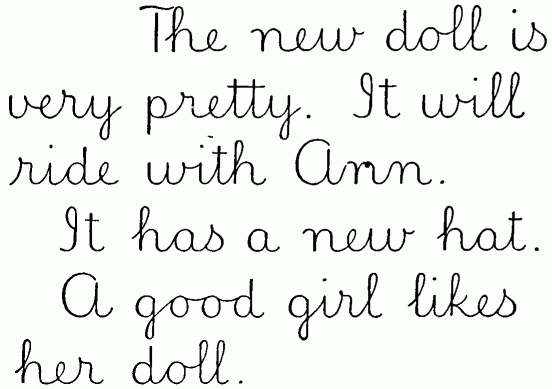
| go | off | did | bad |
| why | here | have | Rov'er |
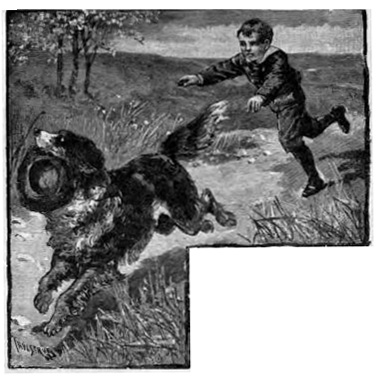
Here, Rover, here! That is my hat! Do not run off with it!
You are a bad dog to run off with my hat. I will not have you with me. You are not a good dog.
You bad dog! Why did you go off with my hat?
| kit'ty | saw | soft | catch |
| fur | its | she | small |
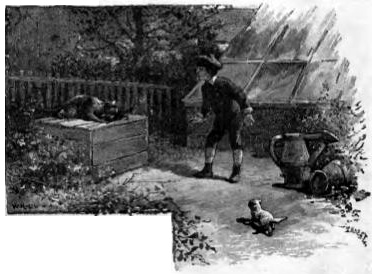
This is my little kitty.
How soft and white its fur is!
Is it not pretty? The cat is on the box. She saw a big rat and ran to catch it.
The kitty was too small to catch the rat.

| up | ho | down | boys | mer'ry | back |
| hill | o'ver |
| Ho, ho! How we go Down the hill, Over the snow. Ho, ho! Back we go, Up the hill, over the snow. Down the hill, and over the snow, We merry boys, how fast we go! |
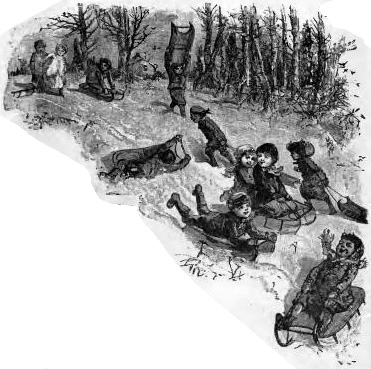 |

| if | race | girls | out |
| look | sled | hurt | now | give |
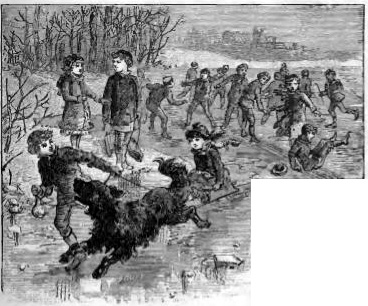
The boys and girls are out at play.
Look out, boy! Do not get hurt!
Will you give me a ride, little boy?
O yes! you may ride on my new sled.
Now, Rover, we will have a race.
Run fast, Rover! If you do not run fast, I will catch you!
Ann likes her small kitty. Its fur is soft and white. It saw the cat catch the big rat.
Ann likes Rover too. She saw Rover run off with the hat. Here, Rover, here! You are a bad dog! Why did you run off with the hat?
Ho, ho! Look at the boys and girls. See them go down the hill, over the snow. Now they go back, up the hill.
They are out at play. They will not get hurt. How merry they are! Ann, I will give you a ride on my sled. We will have a race with Rover and see how fast we can run.
| ĭf | ĭts | băc⃥k | slĕd |
| hō | fûr | ō'vẽr | ḡĩrls̝ |
| ḡō | shē | sŏft | hûrt |
| ŭp | out | boys̝ | hăve⃥ |
| ŏff⃥ | now | lo͝ok | c̵ăt⃥ch |
| dĭd | whȳ | ḡĭve⃥ | sma̤ll⃥ |
| băd | hĭll⃥ | rāçe⃥ | kĭt'ty̆ |
| sa̤w⃥ | down | (rās) | Rōv'ẽr |
| hēre⃥ | mĕr'ry̆ |
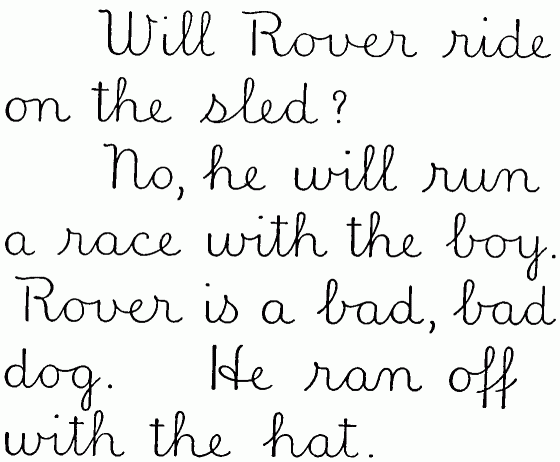
| from | come | be | a way' | there | of |
| what | soon |
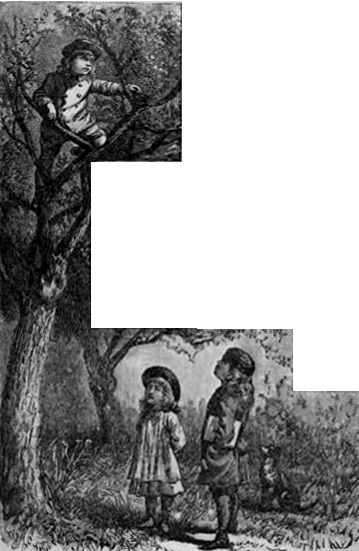 |
Bad boy! bad boy! Come down from that tree. Do not take the eggs from the nest. What a bad boy, to take the eggs of a bird! Go away, bad boy; do not take the eggs, and soon there will be three pretty birds in the nest. |
| Roy | drum | march | rub'-a-dub |
| fun | gun | beat |
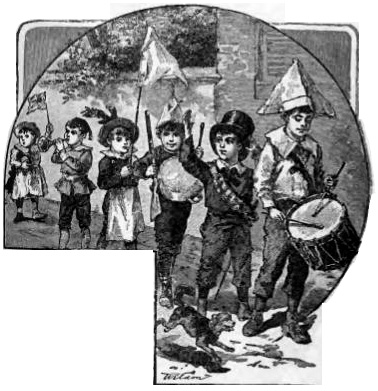
Now, Roy, you beat the drum, and we will march. I have my new hat and gun. Now go on. Rub-a-dub, rub-a-dub! Here we go! March, march, march! Do you like to march, Roy?
Yes. What fun it is to beat a drum, and march with a gun!
| Ned | no | us | let |
| hand | ap'ple | your | some |
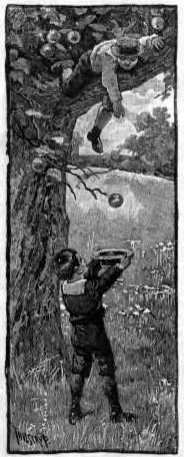 |
Here, Ned, catch this apple in your hand. No, I will catch it in my hat. Now I have it. What a big apple it is! Let us take some to mamma'. O yes! she likes them. I will get her some. We will take them to her in my hat. O here is a very big apple! We will give her this one too. |
| ap'ples | ma'ny | more | glad |
| where | near | pond | am |
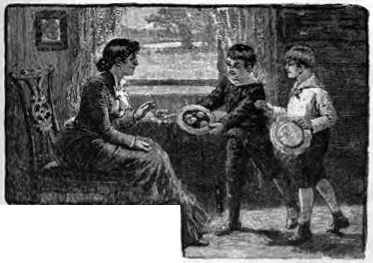
Look, mamma'! See the big apples we have!
O where did you get them?
From the big apple tree, near the pond. Do you like apples, mamma'?
O yes! I am glad to get them. How many have you?
Five, and there are more on the tree. May we give some to Ann?
Yes. She likes apples too.
Boy, come down from that tree! Come away, and soon there will be little birds in the nest.
What a bad boy, to take the eggs of a bird!
Did you see the boys with the drum and gun, Ned?
Yes. I saw Roy beat his drum, rub-a-dub, rub-a-dub! I am glad the boys have a drum. It is fun to march, march, march.
Will you give me the apple you have in your hand, Ned?
No. I will give this one to mamma'. I have some more apples in my hat, and will give you one.
Let us see how many you have. One, two, three, four, five. Where did you get them, Ned?
From the big apple tree down near the pond.
| ŭs | ḡŭn | so͞on | hănd |
| bē | ḡlăd | y⃥o⃥ūr | ŧhêre⃥ |
| nō | bēa⃥t | frŏm | sȯme⃥ |
| lĕt | Roy | whạt | (sŭm) |
| ăm | Nĕd | c̵ȯme⃥ | drŭm |
| fŭn | nēa⃥r | (kŭm) | ăp'ple⃥ |
| of | pŏnd | ma'ny̆ | whêre⃥ |
| (ŏv) | mōre⃥ | (mĕn'y̆) | ăp'ple⃥s̝ |
| ȧwāy⃥' | märch | rŭb'-a-dŭb |
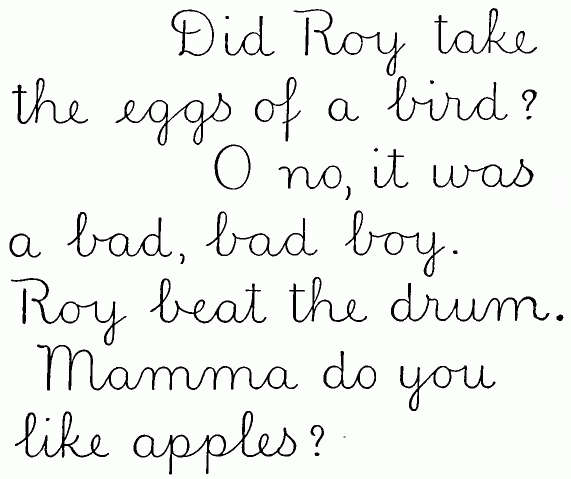
| ship | nice |
| but | sail |
| by | for |
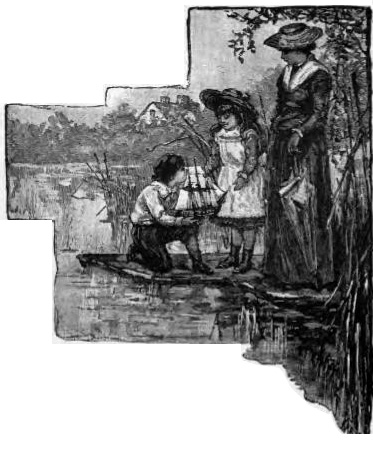
Here we are by the pond. Ned, your ship is a very nice one. May I take it?
Yes, you may; but do not hurt it.
Will it sail fast, Ned?
Yes, it will sail very fast.
Mamma', may I have a ship too?
Yes, if you are a good girl, I will get a nice one for you.
| man | old |
| toys | left |
| book | ask |
| came | know |
| dish'es | fun'ny |
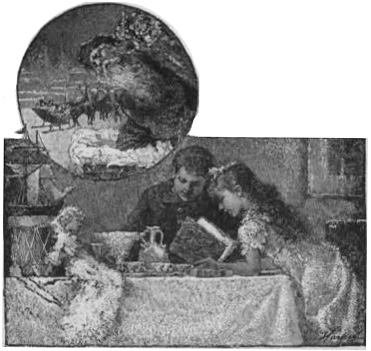
O Roy, do look here! What pretty toys!
Where did they come from?
Here is a drum, a ship, and a top for you; and a doll, a book, and some little dishes for me.
Did mamma' give them to us, Roy?
O no! a funny old man came and left them for us.
What old man was it, Roy?
I do not know what old man it was, but we will go and ask mamma'.
Little girls and boys, do you know who left the toys for Roy and Ann?
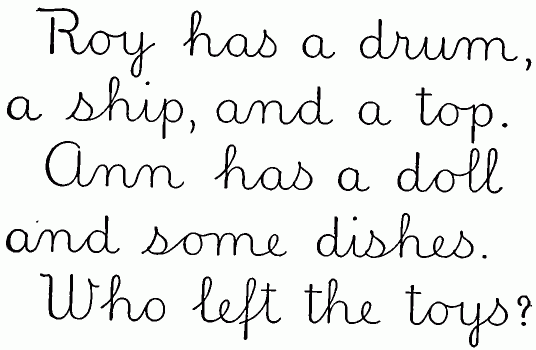
| Ma'ry | in'to | hold | made |
| chicks | well | hay | un'der |
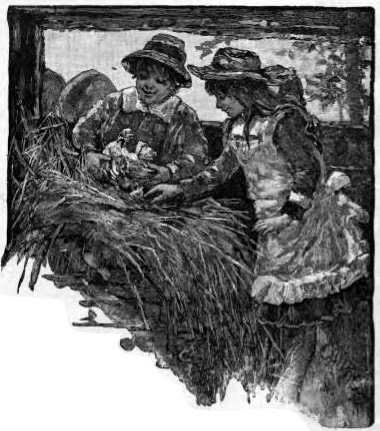
Look, Ned, here is a nest! It is made in this hay, and the old hen is in it.
Put your hand into the, nest, Mary.
O no, the hen will not let me!
But, Mary, I will hold her.
Well, Ned, if you can hold her, I will put my hand into the nest.
O Ned, there are some little chicks under the hen!
Are there?
Do take her off from the nest and let us see them.

| care | dear | feed | six |
| food | hide | wings | wa'ter | chick |
Now, Ned, the hen is off the nest, and we can see the chicks. There are six of them.
O the dear little chicks! How pretty they are!
We will feed them, Mary.
Yes, I will run and get some food and give them some water.
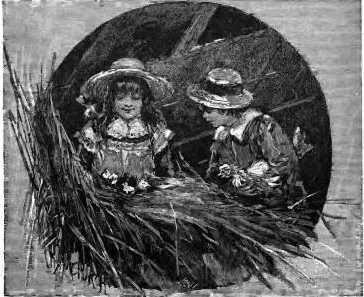
Here, chick, chick, chick! Here is some water for you.
Will the old hen take care of them, Ned?
O yes! She will hide them under her wings.
See, mamma'! What a nice ship Ned has!
Yes, it is a very nice ship. You and Ned may go down by the pond and sail it, but do not get into the water.
Come, Ned, let us go. Did you see Roy?
Yes, and I saw the pretty toys the funny old man left for Mary.
What old man, Ned?
I do not know, but he came and left a ship, drum, book, and some little dishes.
O how good! Look, here is Mary. I will ask her to let me see them.
Now let us go and see the nest the hen made in the hay.
Well, come on. Mary will go too.
Here is the hen, Ned. Let us see if there are some little chicks under her.
Ned, you hold the hen, and Mary will put her hand into the nest.
Is there a chick under her, Mary?
O yes! Take the hen off the nest.
Well! well! Do look at the dear little chicks. One, two, three, four, five, six, of them.
Run, Ned, get some food, and we will feed them.
Will the hen take care of them?
Yes, she will hide them under her wings.
| bȳ | shĭp | bo͝ok | wĭngs̝ |
| bŭt | sāi⃥l | c̵āme⃥ | Mā'ry̆ |
| ōld | wĕll⃥ | ĭn'to̤ | dĭsh'ĕs̝ |
| măn | nīçe⃥ | dēa⃥r | ŭn'dẽr |
| ȧsk | lĕft | hīde⃥ | wa̤'tẽr |
| hăy⃥ | hōld | māde⃥ | fŭn'ny̆ |
| sĭx | fo͞od | chĭc⃥k | c̵âre⃥ |
| fôr | fēe⃥d | chĭc⃥ks | k⃥nōw⃥ |
| toys̝ |
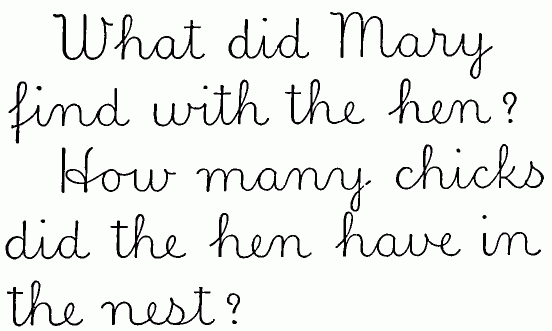
| Fi'do | full | each | seem |
| oth'er | think | say | pup'pies |
Here are my three little puppies. Are they not pretty? Old Fido has a rat. See how the puppies look at it.
They think it will hurt them if they go too near it.
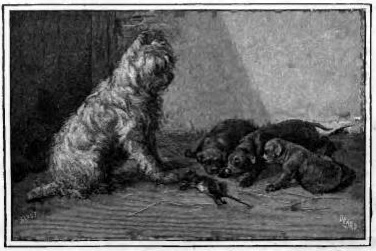
They seem to say, "Take it away, mamma', we do not like it."
The puppies are full of fun. I like to see them play with each other.
Will you have one of my puppies?
| red | side | steer | fear |
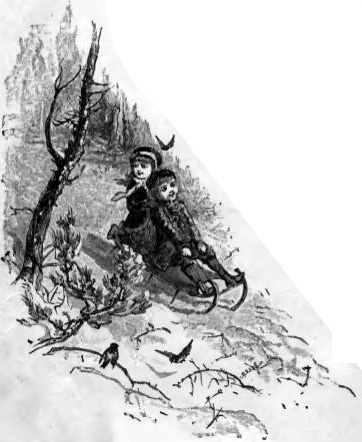 |
See my sled. It is red. Will you ride By my side? Can you steer? Do not fear. How we go On the snow! |
| Jack | Jill | clear | track | all | fall |
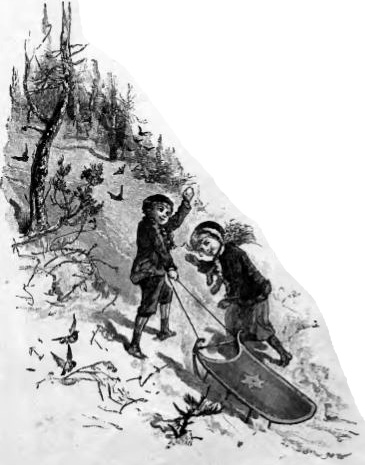 |
Clear the track! Hold me, Jack! Let you fall? Not at all. O what fun! Back they run, Up the hill, Jack and Jill. |
| start | string | strong | hur rah' |
| fly | try | high | kite | kites |
Come on, boys. Let us fly our kites. Hurrah! that will be fun. I will try my new kite. Have you a strong string with your new kite, Ned? Yes, it is very strong. Roy has a kite. How high it is! Yes, Ned, but my kite will fly as high as his. Now you hold it, and I will run to give it a start. |
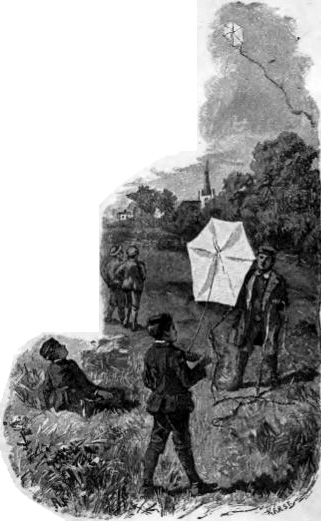 |
| him | held | warm | make | cold |
| does | nose |
| eyes | froze |
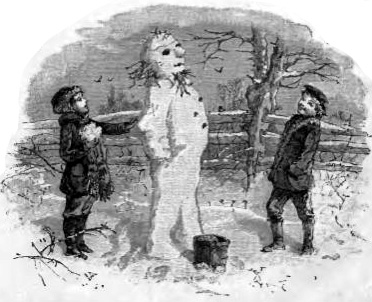
Roy, did you make that snow man?
Yes. Does he not look funny? He is a funny man, Roy. What a big nose he has, and big eyes too!
Will he not fall down?
No, I put some water on him. The water froze, and that held the snow.
Are you not very cold, Roy?
Yes, come, let us have a good run, and that will make us warm.
Hurrah, boys! Clear the track! Here come Jack and Jill on a red sled. Look, Roy! See Jack steer the sled down the hill. Jill is by his side.
Does Jill fear the fast ride?
No, Ned, not at all. Jack will not let her fall. Roy, did you say you made that snow man?
Yes, I made him.
What a funny nose he has! What big eyes! Will he fall down, Roy?
No, he will not fall. I put some water on him. The water froze, and that held the snow.
Let me make one, Roy.
O no! it is too cold. Let us go in and get warm.
Well, we will start now. Come in and see my little puppies. Here they are, and here is Fido too. Do you think they are pretty?
Yes, I do. See them play with each other. They seem to be full of fun. Is this your kite, Roy?
Yes, I have two kites. See what a strong string this one has.
Do you like to fly kites?
Yes, and pretty soon I will try my new one. It will fly very high.
| flȳ | hĕld | trăc⃥k | frōze⃥ |
| trȳ | c̵ōld | sīde⃥ | strĭng |
| sāy⃥ | e⃥ȳe⃥s̝ | Jĭll⃥ | kīte⃥s |
| rĕd | (īz) | Jăc⃥k | stärt |
| a̤ll⃥ | hīg⃥h⃥ | stēe⃥r | strŏng |
| hĭm | (hī) | fa̤ll⃥ | sēe⃥m |
| dȯe⃥s̝ | kīte⃥ | c̵lēa⃥r | ȯŧh'ẽr |
| (dŭz) | fụll⃥ | Fī'dō | (ŭŧh'ẽr) |
| nōs̝e⃥ | ēa⃥ch | wa̤rm | thĭnk |
| māke⃥ | fēa⃥r | pŭp'pĭe⃥s̝ | hụr räh⃥' |
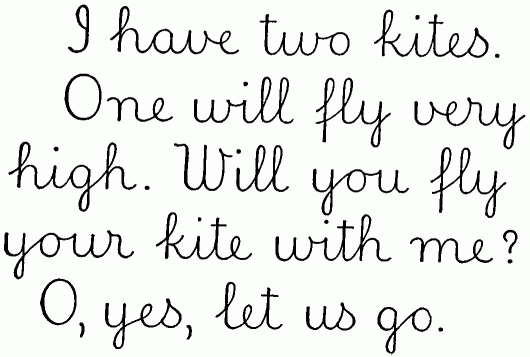
| seek | then | stand | said |
| shut | shall | hid | while | who |
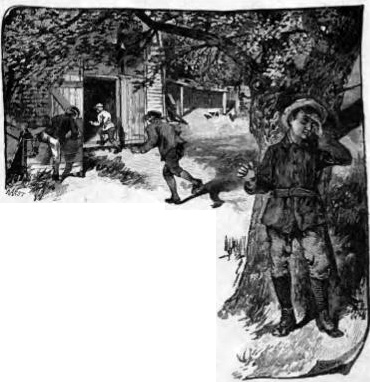
Come, boys, what shall we do? Let us play hide and seek.
O yes! that will be fun for all of us. Who will shut his eyes? Ned, will you?
Yes, I will shut my eyes while you all go and hide.
Well, Ned, you stand by that tree.
Then Ned shut his eyes and the boys ran off to hide. Pretty soon Ned said, "Boys, are you all hid? Yes? Well, here I go. One, two, three, look out for me."
| Frank | Fred | must | black | find |
| barn | cap |
| ha | spy |
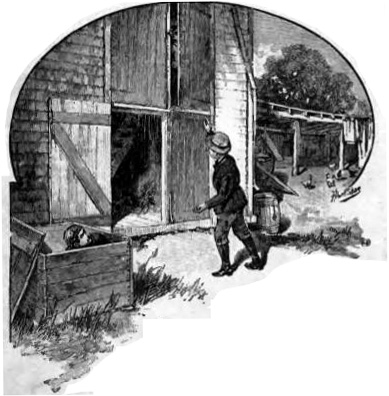
The boys are all hid. Now I must try to find them. Ha! I spy you, Fred. You are in that box.
I spy you, Roy. You are under the hay.
I can not find Frank.
O there he is! I spy you, Frank.
Come out of that barn. I see your black cap.
Fred, you must shut your eyes now, and stand by the tree while we hide.
I will, boys. You go and hide.
| so | bath | sick | please |
| tub | wrap | shawl | sis'ter |
Now, Ned, please do not put my kitty into the bath tub.
Yes, sister, I must give her a bath. Here is the bath tub with some nice warm water.
But, Ned, kitty will get sick if you put her into the water. She will take cold.
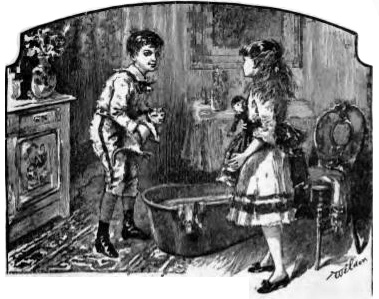
No, I will wrap her well in the big shawl, and then she can not take cold.
So Ned gave kitty a bath, and then put her into the nice warm shawl.
| pass | po'ny | whip | keep |
| fast'er | use | go'ing | than | yours |
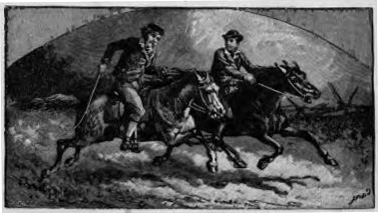
Hold on, Frank, you are going too fast. I can not keep up with you.
Use your whip, Fred, and make your pony go faster. Come up to me and we will have a race.
Well, here we go. Hurrah, hurrah! Go on, pony, as fast as you can, and we will catch Frank.
We are going faster now, Frank, and will pass you in the race. No, Fred, you can not pass me, for my pony can run faster than yours.
Well, we will see if he can.
Who said play hide and seek?
I did, Frank.
Well, shut your eyes, Ned, while we go and hide.
Shall I stand by this tree, boys?
Yes, we will hide, and then you must try to find us.
Well, go and hide.
One, two, three, four, five, six--look out for me, boys.
Here I come. Ha! I see your black cap, Frank. Come out of that barn.
I spy you, Roy. You are hid under the hay; and there is Fred in the box.
Now, Frank, you shut your eyes.
No, Fred, there is my pony, and I am going to take a ride.
Well, I will get my pony, and ride too. Shall we have a race?
Yes, but my pony can run faster than yours.
If I use my whip, I can keep up with you, and I may pass you.
But there is my sister. I must go and see her. What is it, sister?
Please put this shawl over me, Fred. Wrap me up well, for it is pretty cold.
So kitty did not get sick, did she, sister?
O no! kitty is well, but she does not like the bath tub, Fred.
| sō | sĭc⃥k | bärn | y⃥o⃥ūrs̝ |
| hä | fīnd | kēe⃥p | pō'ny̆ |
| hĭd | pȧss⃥ | shăll⃥ | whīle⃥ |
| ūs̝e⃥ | w⃥ho̤ | Frĕd | sha̤w⃥l |
| tŭb | sēe⃥k | whĭp | sĭs'tẽr |
| spȳ | ŧhĕn | w⃥răp | plēa⃥s̝e⃥ |
| c̵ăp | shŭt | mŭst | ḡō'ĭng |
| said | ŧhăn | stănd | fȧst'ẽr |
| (sĕd) | bȧth | blăc⃥k | Frăṉk |
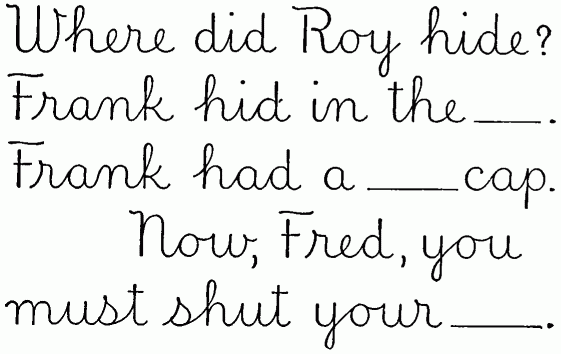
| bear | legs | paws | a fraid' |
| stick | hind | holds | stands |
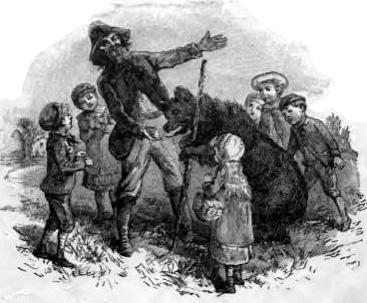
O Frank, look at that big dog!
It is not a dog, Fred. It is a black bear.
Are you not afraid of him, Frank?
No, he will not hurt us. Do you not see the man feed him from his hand? What a funny bear! See, Frank, how he stands up on his hind legs, and holds the stick in his paws! Is he strong, Frank?
Yes, he is very strong, and his fur coat is warm.
Where did the man get him, Frank?
I do not know. We will go and ask him.
| were | things | caught | hunt'ing |
| sir | dance | fell | dogs | cut |
How do you do, sir? How do you do, boys? You have a nice bear there, sir. We like to see him play. Where did you get him? I was hunting with my dogs, and saw a little bear up in a tree. I cut the tree down, and as soon as it fell, the dogs and I caught him. Were you not afraid of him? O no! he was too small to hurt me then. You like to see him play, do you? Yes, sir. What can he do? He can hold a stick in his paws, dance very well on his hind legs, and do many other funny things. |
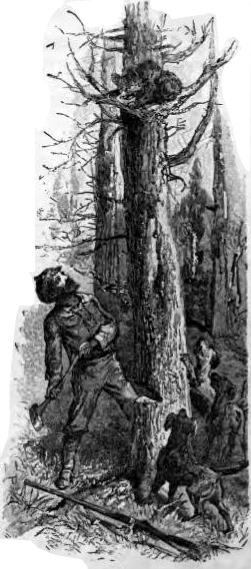 |
| fro | long | mous'ie | run'ning |
| a go' | silk | al'ways | com'ing |
| time | glow | spied |
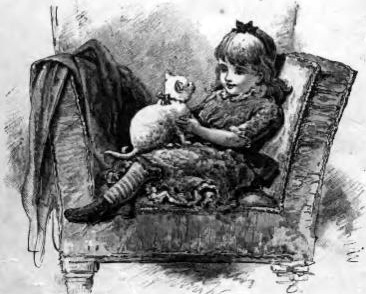

Mamma', did you see the kitty catch the little mousie in the barn?
Yes, kitty spied the mousie running to and fro.
I saw her pretty black eyes glow, and soon she caught the mousie in her paws.
What a pretty kitty she is! Her fur is like silk.
But look, mamma'! There is the man coming with his bear. May I go out to see him?
Yes, Fred, but Frank must go with you.
How well the bear stands up on his hind legs!
Yes, and see how he holds the stick in his paws.
O see him dance! What funny things he does! Where did the man get him, Frank? Did you ask him?
Yes, and he said that one time, a long while ago, he and his dogs were out hunting, and saw the bear up in a tree.
The bear was small then, so he was not afraid of him.
He cut the tree down, and as soon as it fell, the dogs caught the bear.
Did they hurt him, Frank?
No, the man did not let them hurt him.
See, Frank, the man is coming here.
How do you do, boys?
How do you do, sir?
We like to see your bear play. We think he likes you.
O yes! he likes me, for I always take good care of him.
| frō | ḡlōw⃥ | hīnd | c̵a̤u⃥g⃥h⃥t |
| ȧ ḡō' | tīme⃥ | wẽre⃥ | ȧ frāi⃥d' |
| sĩr | lŏng | spīe⃥d | a̤l'way⃥s̝ |
| c̵ŭt | sĭlk | hōlds̝ | mous'ĭe⃥ |
| lĕḡs̝ | be⃥âr | dȧnçe⃥ | c̵ȯm'ĭng |
| dŏḡs̝ | pa̤w⃥s̝ | thĭngs̝ | rŭn'nĭng |
| fĕll⃥ | stĭc⃥k | stănds̝ | hŭnt'ĭng |
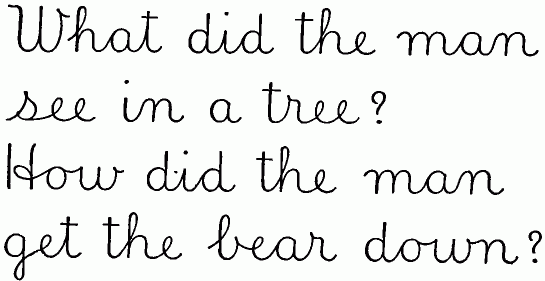
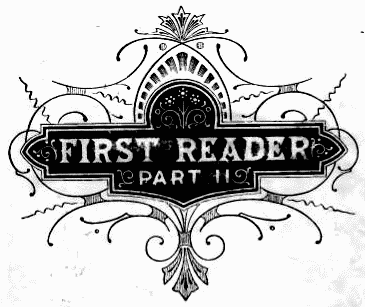
| Jŏh⃥n | sĕt | jŭst | wĕnt |
| Dĭc⃥k | hōle⃥ | trăp | quĭc⃥k |
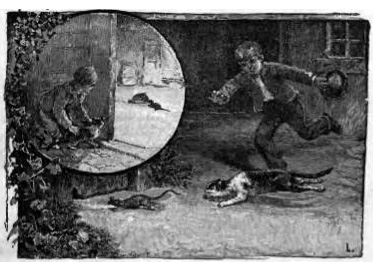
| ă | ăn | ănd | hănd | stănd |
| ăt | răt | c̵ăt | c̵ătch | hăt |
John and his cat Dick do not like rats. They catch all they can. One time, John set a trap to catch some, and then went away and hid with Dick.
Pretty soon a big rat came out of its hole and went to the trap.
Dick saw the rat, and made a start to get away from John. But John said, "Hold on, Dick, let us see if it will go into the trap."
But the rat did not go in, and as it was going to run away, John let Dick go, and said, "Catch it, Dick. Run quick, quick!" and they ran very fast to catch the rat.
But the rat was too quick for them. It went into its hole just as Dick was very near it.

| pĕts | sĕnd | lo͝oks | c̵āġe⃥ | yĕt |
| sĕnt | c̵rĕst | whĕn | tāme⃥ | sĭng |
| ĕ | ĕnd | sĕnd | sĕnt | nĕst |
| lĕt | sĕt | gĕt | yĕt | rĕd |
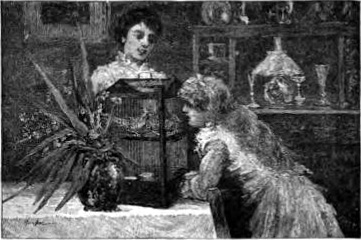
Mary, where did you get your pretty redbirds?
Fred sent them to me.
Did he send the cage too?
No, mamma' gave me the cage.
What nice pets the birds will be! Are they tame, Mary?
Not yet, but I think they soon will be. They let me set food near them now.
When they are tame, you can let them out of the cage.
What a funny cap one of them has!
It looks like a cap, Mary, but it is not. It is a crest.
Many redbirds have no crest, and I am glad that one of your birds has one.
Will these birds sing well?
They sing very little. Redbirds are pretty, but they do not sing so well as some other birds.

| dĭp | fĭsh | trout | bro͝ok |
| nĕt | lĭve⃥ | dĭsh | wĭsh | c̵ọu⃥l⃥d |
| ĭ | ĭn | ĭn'to̤ | ĭs̝ | hĭs̝ |
| ĭsh | dĭsh | fĭsh | wĭsh |
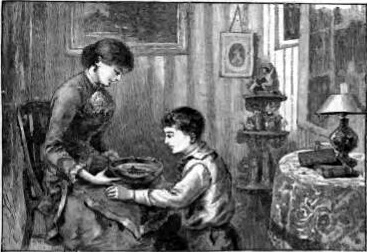
Look, mamma'! See what a pretty fish! It is a little trout.
Where did you get it, John?
Frank caught it in the brook.
I went to dip a dish into the brook to get some water, and saw this little fish.
Then I said, "O Frank, look, look quick! See the little fish!"
Frank saw it, and ran to get his fish net. He put the net into the water, and caught the fish, and I put it into this dish
.Well, what will you do with it?
I will keep it, mamma'.
But, my boy, it will not live in that dish. Put it back into the brook.
I wish I could keep it. It is so pretty! May I put it into the pond?
No, John. You must put it into the brook. A trout will not live in warm water.

| ḡŏt | jŏl'ly̆ | rŏmp | brĕa⃥d |
| fŏx | ēa⃥t | fŏnd | ȧft'ẽr | mēa⃥t |
| ŏ | ŏx | bŏx | fŏx | dŏḡ | nŏt | tŏp |
John, where did you get your fox? I caught him in a trap, when he was small. Is he tame now? O yes! and he is very fond of me. We romp, and play, and have a jolly time with each other. What do you give him to eat? I give him meat and bread. Can a fox run fast, John? |
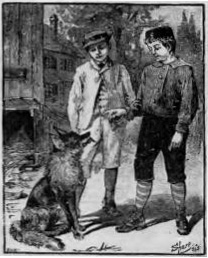 |
Yes. My fox can run very fast. A little while ago, Frank was here with his dog Rover. The fox was afraid of Rover, and ran away.
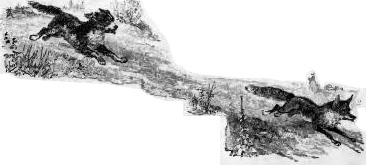
When Rover saw the fox start, he ran after him. O how they did go! They ran and ran, up hill, and down hill, but the fox ran faster than Rover, and got away.
How did you get him back?
O when Rover went away, he soon came back to me. I do not let dogs run after him now.

| Jāne⃥ | jŭmp | mŭch |
| c̵ŭp | rōpe⃥ | lŭnch |
| tā'ble⃥ | châi⃥r |
| mĭlk | bŭt'tẽr |
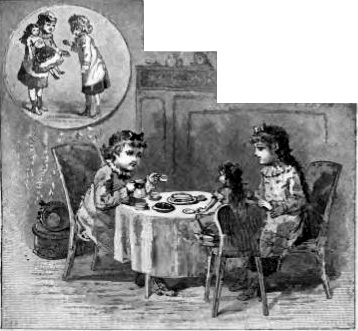
| ŭ | ŭp | c̵ŭp | pŭp | ḡŭn | fŭn |
| ŭt | bŭt | c̵ŭt | shŭt | tŭb | rŭb |
O Jane! I am glad you have your doll with you. How pretty it is!
Yes, Mary, I think it is a pretty doll. I like it very much. You are just in time for lunch. We will have it here on my little table.
O that will be jolly fun, Mary! I will set the table, and put on your little dishes.
Yes, Jane, you set the table, and I will run and ask mamma' for some bread and butter and cold meat.
Get a cup of milk, too, Mary.
Yes, here they are--bread, butter, cold meat, and a cup of nice milk.
Well, here is a chair for you, one for me, and one for my doll.
What shall we do after lunch?
We will jump rope, Mary. I have a nice new rope.
O so have I! Mamma' just gave me one.
But, Mary, we must not jump rope too much. It is not good for us.
Well, we will jump but a little while, and then I must go home.

| dāy⃥ | lāke⃥ | stāy⃥ | hōme⃥ |
| wāy⃥ | lāte⃥ | swĭm | splăsh |
| mouth | răb'bĭt |
| ā | dāy⃥ | sāy⃥ | māy⃥ | hāy⃥ |
| tāke⃥ | māke⃥ | māke⃥s | tāme⃥ | c̵āme⃥ |
One day Ann and Frank went to the lake with Rover.
Rover can swim well, so Frank made him go into the water after a stick.
"Jump, Rover! Jump in and get the stick," said Frank; and into the water he went with a big splash.
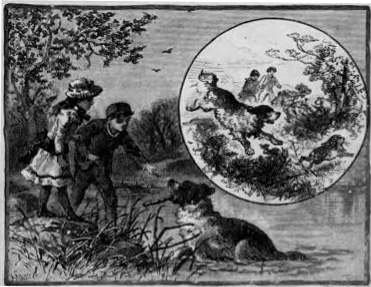
Pretty soon he came out with the stick in his mouth.
He did not like the fun so well as Frank, for the water was a little cold.
They had a fine time for a while with Rover, and then set out for home, as it was late in the day, and they could not stay long.
On the way home, Rover saw a rabbit, and away he went after it, as fast as he could go.
Ann and Frank ran too, but could not keep up with Rover and the rabbit.
When they got home, Rover was there, and Frank said--
"Where is the rabbit, Rover?"
Rover gave Frank a funny look and went away.
"O I know!" said Frank, "the rabbit ran so fast you could not catch it."

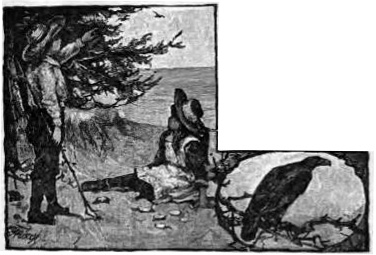
| sēa⃥ | ēa⃥'ḡle⃥ |
| bēa⃥k | bēa⃥ch |
| lärġe⃥ | wȯu⃥l⃥d |
| wa̤nt | lär'ġẽr |
| ē | mē | wē | bē | hē | shē |
| ēa⃥t | bēa⃥t | mēa⃥t | sēe⃥ | sēe⃥k | sēe⃥m |
Look, sister! See that eagle!
Yes, Frank, I see two eagles. What large wings they have!
Yes, they fly over the beach to find fish.
Do they eat fish, Frank?
Yes, they are very fond of fish. The eagle is a large and strong bird. Mamma' saw one take up a rabbit and fly off with it.
I wish we could catch one, Frank. How funny it would look in a cage!
Yes, sister, but you would have to get a much larger cage than the one your redbirds have.
O I am afraid it would hurt me. If it got out of the cage, it would fly away with me.
No, it could not do that, but it could hurt you with its strong beak.
What is its beak, Frank?
The beak is its mouth. All birds have a beak, but not many have one so strong as that of the eagle.

| īçe⃥ | fär |
| kīnd | fīre⃥ |
| tīre⃥d | skāte⃥ |
| drīve⃥ | mīle⃥s̝ |
| sĕv'e⃥n |
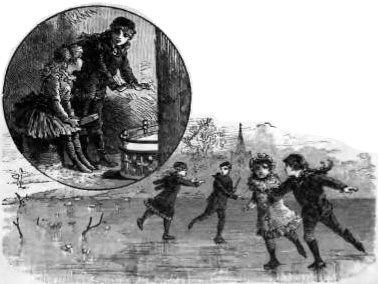
| ī | īçe⃥ | nīçe⃥ | fīnd | kīnd | rīde⃥ | sīde⃥ |
You are very kind, Mary, to have a nice fire for me. I am cold after my long drive.
Yes, Fred, you look cold and tired, but you will soon get warm by this fire. How far did you drive?
Seven miles, and the snow and ice made it a cold ride.
Can we skate on the lake now, Fred?
Yes, the ice is strong. We can have a good skate. Do you want to go and try it?
O yes, Fred! I like to skate. Will you go with me?
Yes, as soon as I get warm. But John and Ann are coming over to see us.
Well, Fred, we will ask them to go with us. Ann likes to skate.
O yes! if they go, we shall have a merry time.
What fun it will be, Fred! I will run now and find my hat. We will go as soon as they come.

| rōll | tĕll⃥ | wāve⃥s̝ | dăshe⃥d |
| c̵ōa⃥t | pȧ pä' | c̵ăp'ta⃥ĭn | lẽa⃥rne⃥d |
| bōa⃥t | wĭnd | blōw⃥s̝ |
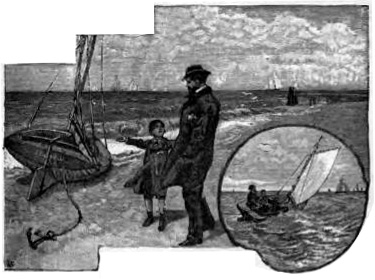
| ō | ōld | c̵ōld | hōld | nō | snōw⃥ |
| sō | ḡō | k⃥nōw⃥ |
Papa', I want to sail in the new boat. Will you take me out?
It is pretty cold, Frank. See how the wind blows, and how the waves roll on the beach. I know it is cold, papa', but I have on a warm coat.
Well, come on. I will hold the boat while you get in.
So Frank and his papa' got into the boat and put up the sail.
The waves were very high, but Frank was not afraid. The boat was strong, and his papa' could sail it well.
The waves dashed over the side of the boat, but the more they dashed, the more fun it was for Frank.
When Frank got to be a man, he was so fond of the water that he went to sea in a large ship.
He learned how to sail the ship, and after a while, he was made captain of it.
He is an old man now, and likes to tell little boys and girls all he learned and saw while he was captain of a ship.

| tūne⃥ | ūs̝e⃥d | mū's̝ĭc⃥ | sc̵h⃥o͞ol |
| flūte⃥ | mīne⃥ | plāy⃥e⃥d | ȧ ḡain' |
| (ḡĕn') |
| ū | ūs̝e⃥ | ūs̝e⃥d | ūs̝'ĭng |
One day, when Frank and John were going to school, they saw an old man with a flute.
"Will you please play a tune for us, sir?" said Frank.
"Yes, boys, I will play for you. Are you fond of music?" "Yes, sir, we like music. You used to play your flute when I went with mamma' to see you."
"O you are the little boy who had your flute with you, are you?"
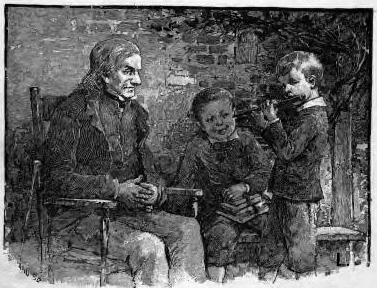
"Yes, sir, and I have learned to play a little on it."
"Well, I am glad to see you again, my boy.
"I will play you a tune, and then you must play for me."
"But my flute is at home, sir."
"O well, you can use mine. It is a good one."
The old man played a tune for the boys, and then gave the flute to Frank to play.
Frank played a tune, and did it very well.
"How well you play!" said the old man.
"You are very kind to say that, but I wish I could play as well as you do," said Frank.
"O you will soon do that. All you will have to do is to try."

Be the matter what it may, Always speak the truth. If at work, or if at play, Always speak the truth.
Do your best, your very best,
And do it every day.
Little boys and little girls,
That is the wisest way.
Little children, love each other,
Never give another pain,
If your brother speak in anger,
Answer not in wrath again.
Early to bed and early to rise,
Make men healthy, wealthy, and wise.
Suppose your task, my little man,
Is very hard to get?
Will it make it any easier
For you to sit and fret?
Then wouldn't it be wiser
Than waiting like a dunce,
To go to work in earnest,
And learn the thing at once?
Speak the truth, and speak it ever,
Cost it what it will;
He who hides the wrong he did,
Does the wrong thing still.
To do to others as I would
That they should do to me,
Will make me honest, kind, and good,
As children ought to be.
When mother says, "Do this," or "that,"
Don't say, "What for?" and "Why?"
But let her hear your gentle voice
Say, "Mother dear, I'll try."
| ā | as | in | lāke | ē | as | in | bē | ŏ | as | in | bŏx |
| ă | " | " | ăt | ĕ | " | " | lĕt | ū | " | " | ūs̝e |
| ä | " | " | fär | ẽ | " | " | hẽr | ŭ | " | " | ŭp |
| a̤ | " | " | a̤ll | ī | " | " | īçe | û | " | " | fûr |
| â | " | " | c̵âre | ĭ | " | " | ĭn | o͞o | " | " | to͞o |
| ȧ | " | " | ȧsk | ō | " | " | sō | o͝o | " | " | lo͝ok |
| oi, | oy | (unmarked), | as | in | oil, | boy |
| ou, | ow | " | " | " | out, | now |
| b | as | in | băd | m | as | in | mē | y | as | in | yĕs |
| d | " | " | do̤ | n | " | " | nō | z | " | " | frōze |
| f | " | " | fŏx | p | " | " | pụt | ng | " | " | s |
| ḡ | " | " | ḡō | r | " | " | răt | ch | " | " | chĭc⃥k |
| h | " | " | hē | s | " | " | sō | sh | " | " | shē |
| j | " | " | jŭst | t | " | " | to͞o | th | " | " | thĭn̄k |
| k | " | " | kīte | v | " | " | vĕry̆ | th | " | " | thē |
| l | " | " | lĕt | w | " | " | wē | wh | (hw), | " | whạt |
| ạ | like | ŏ | as | in | whạt | ȯ | like | ŭ | as | in | c̵ȯme |
| ê | " | â | " | " | whêre | ô | " | a̤ | " | " | fôr |
| e̱ | " | ā | " | " | the̱y | ō | " | û | " | " | wōrk |
| ĩ | " | ẽ | " | " | gĩrl | ụ, ọ | " | o͝o | " | " | pụt, c̵ọuld |
| ï | " | ē | " | " | polïçe | ȳ | " | ī | " | " | bȳ |
| o̤, ṳ, | " | o͞o | " | " | to̤, rṳle | y̆ | " | ĭ | " | " | kĭt'ty̆ |
| ç | like | s | as | in | rāçe | ġ | like | j | as | in | c̵āġe |
| c̵ | " | k | " | " | c̵ăt | ṉ | " | ng | " | " | thiṉk |
| c̵h | " | k | " | " | sc̵hool | s̝ | " | z | " | " | hăs̝ |
| çh | " | sh | " | " | maçhine | x | " | ks | " | " | bŏx |
| x̝ like gz as in ex̝ist |
See p. 3, §4.
[B]It is intended that these selections shall be memorized by pupils, but as they do not form any part of the reading lessons, the words not heretofore used are not regarded as "new words."